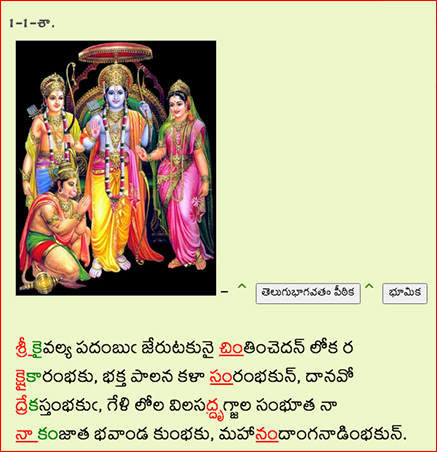Tag: BL Dravidian
Telugu
The Languages of Berkeley: An Online Exhibition

Telugu is a Dravidian language that is spoken in southern Indian, and is the official language of the Indian states of Andhrapradesh and Telangana. With more than 75 million native speakers, it has an epigraphical presence going back to the 6th century CE and a literary tradition that began in the 11th century.
Telugu’s literary tradition began with the translation of Sanskrit sacred and literary texts. Over the centuries, however, the language developed its own literary forms and canon. One text that was a translation from Sanskrit but went on to have a profound impact on Telugu’s literary heritage was Pōtana’s (also spelled, Pōthana) translation of the Bhāgavatapurāṇa called Śrīmahābhāgavatamu. The Bhāgavatapurāṇa is a major scripture of the Vaishnava tradition of Hinduism that describes the incarnations of the god Vishnu, especially as Krishna, and also explains the tradition’s cosmological, theological, and soteriological beliefs. Needless to say, the Bhāgavatapurāṇa is the focus of intense study and devotion among Vaishnavas, and Pōtana’s translation continues to be so for Telugu speakers.
Pōtana lived in the latter half of the 15th century. He is traditionally believed to have been born to a Niyogi Brahamin family living in a village called Bammera in the Jangaon district of present day Telangana. He was a naturally gifted poet, and earned his living as a farmer. A devout and religious man, he was inspired to translate the Bhāgavatapurāṇa after a religious experience.
Pōtana’s poetic style with its rhythmic use of alliteration and his devotion-steeped emotions have ensured a lasting fame for his Śrīmahābhāgavatamu. Pōtana’s literary devotional offering continues to inspire reverence among Telugu-speaking devotees of Lord Krishna. In addition, experts on Telugu literature continue to appreciate the linguistic and literary merits of his work while even illiterate people are familiar enough with it to quote its verses when discussing spiritual and ethical matters.
Telugu has been taught at Berkeley for several decades, currently Ms. Bharathy Sankara Rajulu holds a joint appointment as Lecturer in Tamil and Telugu in the Department of South & Southeast Asian Studies.
Contribution by Adnan Malik
Curator and Cataloger for the South Asia Collection
South/Southeast Asia Library
Title: Bhāgavatapurāṇa
Title in English: Bhagavatapurana
Author: Pōtana, active 15th century.
Imprint: latter half of 15th century
Language: Telugu
Language Family: Dravidian
Source: www.telugubhagavatam.org
URL: http://telugubhagavatam.org/?tebha&Skanda=1&Ghatta=1
Other online editions:
- Dasama Skandha of Pōtana’s Bhāgavata Purāna: A Literal Translation into English (Part I) by T. S. B. Narasaraju (accessed 8/11/20)
- Dasama Skandha of Pōtana’s Bhāgavata Purāna: A Literal Translation into English (Part II) by T. S. B. Narasaraju (accessed 8/11/20)
- Excerpts From Potanas Bhagavatam by A.V.S. Sarma. Tirupati: Tirumala-Tirupati Devasthanams, 1957. Internet Archive (Digital Library of India)
Select print editions at Berkeley:
- Mahākavi Bammera Pōtanāmātya praṇīta Śrī Mahābhāgavatamu. Haidarābād: Pōṭṭi Śrīrāmulu Telugu Viśvavidyālayaṃ, 2006.
The Languages of Berkeley is a dynamic online sequential exhibition celebrating the diversity of languages that have advanced research, teaching and learning at the University of California, Berkeley. It is made possible with support from the UC Berkeley Library and is co-sponsored by the Berkeley Language Center (BLC).
Follow The Languages of Berkeley!
Subscribe by email
Contact/Feedback
ucblib.link/languages
![The Languages of Berkeley [fan]](https://update.lib.berkeley.edu/wp-content/uploads/2019/02/fan_languages-450px.jpg)